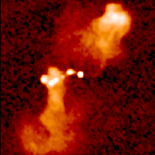
Radio Quasar 3C215 (NRAO/AUI)
Astronomy 309R - Fall 2009
GALAXIES, QUASARS, AND THE UNIVERSE
TTh 9:30-10:45 · WEL 3.502 · Unique No. 49510
Professor
RLM 17.214 · (512) 471-3397 · email
Courses - Fall '09 | Blackboard [Bb]
|
|
|
Course Web Page
Course information including important announcements, reading and homework assignments, homework solutions, lecture notes, and study guides will be made available within the University's Blackboard Learning System: https://courses.utexas.edu
Instructor
Dr. Milos Milosavljevic
Office location: RLM 17.214
Phone and voice mail: (512) 471-3397
Email: milos@astro.as.utexas.edu
Teaching Assistants
Daniel Kagan
Office location: RLM 16.327
Phone: (512) 471-6858
Email: kagan@astro.as.utexas.edu
Alan Sluder
Office location: RLM 16.327
Phone: (512) 471-6858
Email: alsluder@astro.as.utexas.edu
Chi-Ting Chiang
Office location: RLM 16.216
Phone: (512) 471-0445
Email: chiang@astro.as.utexas.edu
Exam Review Sessions: Tuesdays 6-7 p.m.
Review Session Location: RLM 15.216b
COURSE OBJECTIVES
This course provides an introduction into our basic understanding of the formation, structure, and evolution of the universe. Where do the light and the matter permeating space come from? What do we really mean when we say that "the universe is expanding"? How do we know that it was hot and dense at the beginning? What was the Big Bang, and what are the residual traces of this event? How did the intricate cosmic structure, evident in vast astronomical surveys, come into existence? Why are there billions upon billions of stars in every galaxy, and billions of galaxies in the observable universe? What are black holes and what is their unique role in the transformation of galaxies? Where are the boundaries of the present understanding? What are the missing pieces, and what are the scientists doing to complete the picture? Along with a review of modern cosmology, we will briefly discuss the historical emergence of the discipline from its pre-scientific precursors. While tracing the evolution of the universe to its beginnings, we will review recent and future experiments and missions, conducted on Earth and in space, to explore and measure the universe. We will use these examples to illustrate the mechanisms of scientific discovery that set science apart from other endeavors.
PREREQUISITES, LECTURES, HELP SESSIONS, OFFICE HOURS, AND STUDENTS WITH DISABILITIES
Prerequisites
To take Astronomy 309R, you should have taken a descriptive introduction to astronomy, such as Astronomy 301, 302, or 303, or have obtained consent of the instructor.
Hours and Venue
The class meets in Robert A. Welch Hall (WEL) 3.502 on Tuesdays and Thursdays at 9:30-10:45 a.m.